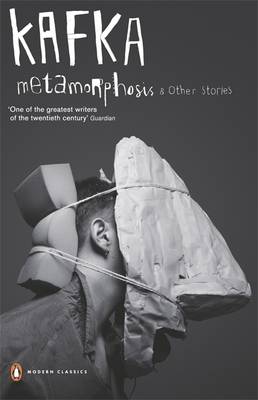I don’t know why it has taken me so long to get around to reading Kafka, except perhaps that it’s only too easy to dwell on the writers you’d like to read one day, to the point that ‘one day’ never comes. Anyway, I’ve bought myself a copy of the 2007 Penguin Modern Classics edition of Metamorphosis and Other Stories, which collects together the stories that Kafka allowed to be published in his lifetime, all translated by Michael Hofmann. I am starting from the beginning, with the short pieces collected in 1913 as Contemplation. What I’m going to do for now is just pick out a few of these pieces and try to capture what struck me, what it was like to read them. No doubt there will be much more to see once I’ve read deeper into Kafka’s bibliography, but this blog is meat to record reading as a work-in-progress – so…
What I’d really like to do with ‘The Sudden Walk’ is reproduce the whole thing and let it speak for itself, because quoting it can’t capture the effect. But I have to try. The piece consists of two single-sentence paragraphs. The first takes up a page, and is an extraordinary cascade of details (or, perhaps, conditions):
When it seems we have finally decided to stay home of the evening, have slipped into our smoking jackets, are sitting at a lit table after supper, and have taken out some piece of work or game at the conclusion of which we customarily go to bed, when the weather outside is inclement, which makes it perfectly understandable that we are staying at home….
This sentence is wonderfully open in terms of where it could go, but there’s also a sense of indecisiveness – and, indeed, halfway through, ‘we’ change our minds and go back out again. The result of this is that the family “drifts into vaporousness, whereas we ourselves, as indisputable and sharp and black as a silhouette, smacking the backs of our thighs, come into our true nature.” The openness of the sentence is closed off with that ‘smacking’ – a sense of finality, even confidence, with coming into one’s ‘true nature’, tempered by the insubstantiality of the silhouette image.
Then comes the second sentence-paragraph: “And all this may even be accentuated if, at this late hour, we go to seek out some friend, to see how he is doing.” The relative brevity of this sentence feels like an even firmer closing-off, a trapdoor over the first paragraph. But it also opens up an entirely new possibility – visiting the friend – which, of course, we’ll never get to see. The world is open, closed, open and closed again, all from a decision to leave the house one evening.
Book details (Foyles affiliate link)
Contemplation (1913) by Franz Kafka, in Metamorphosis and Other Stories (2007), tr. Michael Hofmann, Penguin Modern Classics paperback

Recent Comments